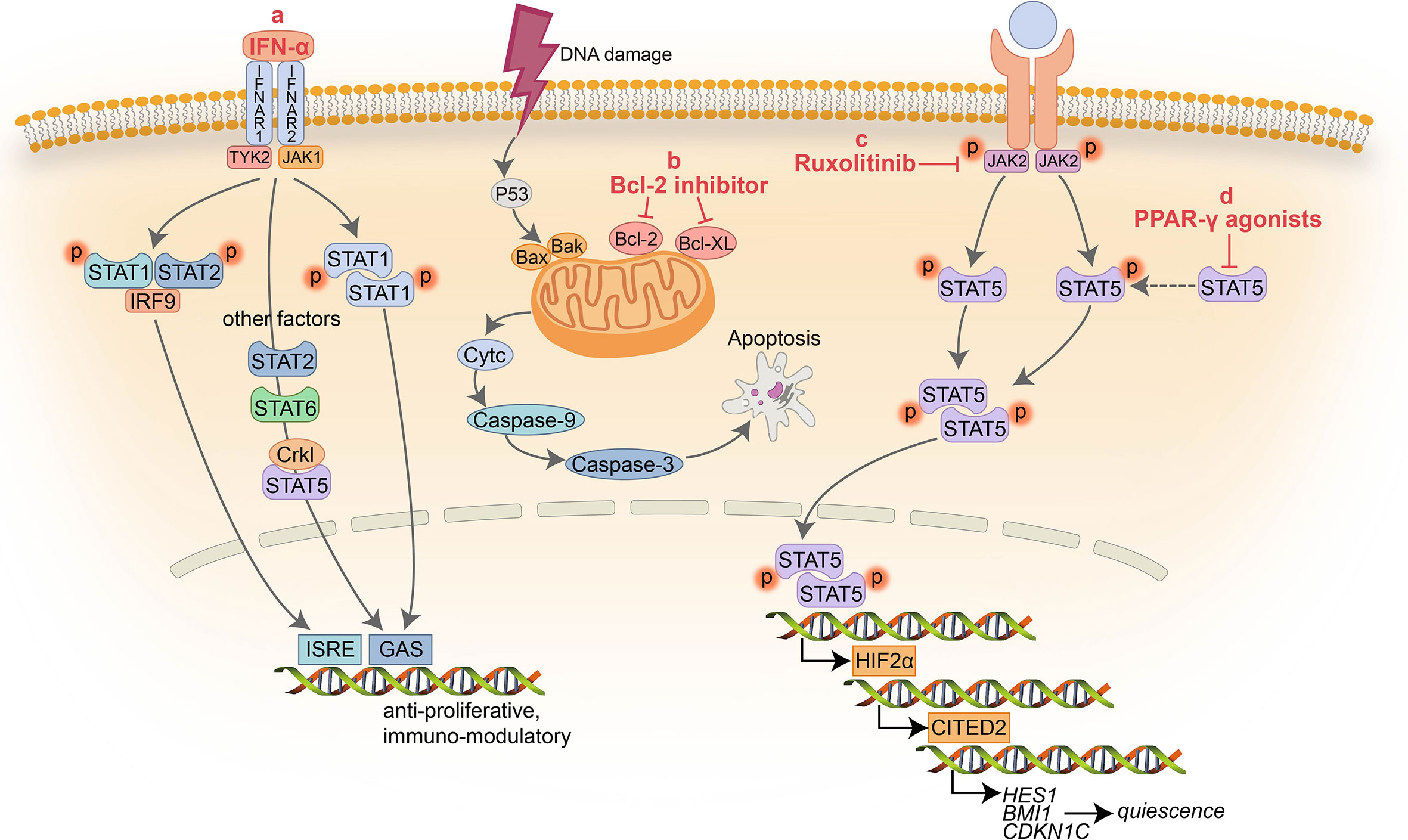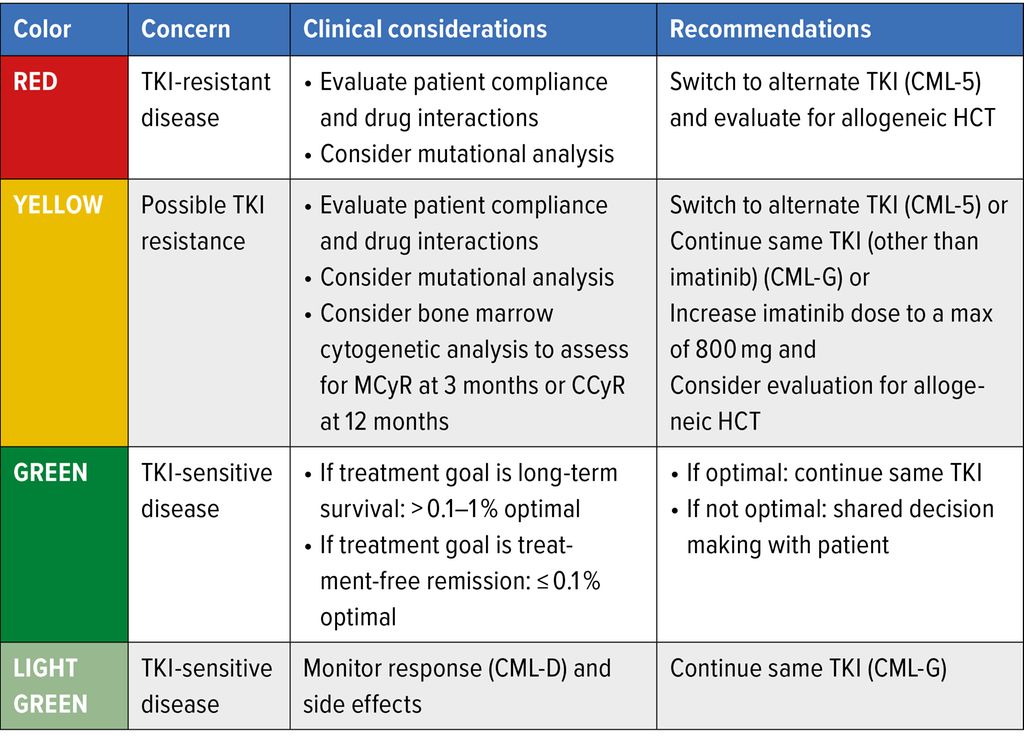Discontinuation of tyrosine kinase inhibitor TKI therapy appears to be safe among adult patients with chronic myeloid leukemia CML in the chronic phase who have achieved and maintained a deep molecular response DMR according to the updated NCCN Clinical Practice Guidelines in Oncology NCCN Guidelines for CML. For patients with chronic phase chronic myeloid leukemia CP-CML there is an increasing focus on personalization of therapy with dose modifications of tyrosine kinase inhibitors TKIs to reduce side effects and maintain efficacy.

Frontiers Combination Therapies In Chronic Myeloid Leukemia For Potential Treatment Free Remission Focus On Leukemia Stem Cells And Immune Modulation Oncology
This slows or stops the bone marrow from making abnormal white blood cells.

Tki therapy for cml. But every drug has some toxic responses against the body mechanism or metabolism that has to be overcome either by drug dose modifications or in some cases by permanently discontinuing the drug. Absence of MMR in the presence of a CCyR is not considered a treatment failure. Although TKIs are found to be one of the effective targeted chemotherapy for treatment of individuals with CML.
Imatinib was the first TKI approved for the treatment of CML on the basis of a high level of activity in phase 2 studies including patients who were resistant or intolerant to interferon With regard to the frontline therapy in the IRIS study the estimated rate of. According to Neil P. Ponatinib is a third-generation 3G TKI approved for patients with CML resistant to 2 TKIs and for patients with T315I mutations 38 46.
Because CML patients may need to continue TKI therapy indefinitely the long-term safety of each treatment option must be considered. However contemporary evaluations of frontline TKI choice and the factors associated with TKI. There are even less data regarding the duration of TKI treatment in the pediatric CML in chronic phase CML-CP patients who may receive over 60 years of therapy.
Ponatinib is a third-generation 3G TKI approved for patients with CML resistant to 2 TKIs and for patients with T315I mutations 38 46. Within these clinical studies 40-60 of patients had a molecular recurrence requiring TKI re-initiation. The recommended first-line treatment for the chronic phase of CML is tyrosine kinase inhibitor TKI therapy.
Most often resistance to tyrosine kinase inhibitors TKI used to treat chronic myeloid leukemia CML is caused by changes mutations in the part of the BCR-ABL gene that makes the BCR-ABL protein. Other drugs dasatinib nilotinib bosutinib ponatinib have been approved for patients who are. Nccn guidelines state that discontinuation of tki therapy appears to be safe in select cml patients but recommend consultation with a cml.
They work by switching off inhibiting the tyrosine kinase made by the BCR-ABL1 gene in leukaemia cells. Efficacy of TKIs in Different Clinical Scenarios TKI Treatment in Newly Diagnosed Chronic Phase CML Patients Imatinib. Of the 25 patients 76 discontinued therapy in sustained deep molecular response SDMR and 24 were in unsustained DMR UDMR.
This can cause the TKI to stop working. However more recent studies show later. Discontinuation of therapy due to adverse effects was observed in 5 and 50 of the patients in.
If there is no CCyR or MMR. Researchers cautioned though that these patients must be closely monitored to make sure the cancer has not come back. This drug is a pill taken once a day with or without food.
The choice of BCR-ABL1 tyrosine kinase inhibitors TKI for the first line of therapy LOT for chronic-phase chronic myeloid leukemia CML is tailored to disease risk and patient characteristics like comorbidities which become more prevalent with age. Mutations change the shape of the BCR-ABL protein so that certain TKIs can no longer bind to it effectively. Per ELN 2020 recommendations ponatinib is preferred over an alternative 2GTKI in patients without significant cardiovascular risk factors who are resistant to a 2GTKI without specific mutations 5.
While these drugs have greatly improved the prognosis for CML many patients ultimately fail treatment some requiring multiple lines of. The primary treatment for newly diagnosed CML-CP is a tyrosine kinase inhibitor TKI including the first-generation TKI imatinib and second-generation TKIs dasatinib and. As children and adolescent are treated for longer times with TKIs it has become clear that toxicities may make long-term TKI therapy less attractive compared to allogeneic HCT.
Acceptable method of confirming diagnosis of CML At 3 months and 6 months after initiation of TKI therapy if QPCR IS is not available. This treatment can potentially bring the cancer into remission which happens when no. At 12 months and beyond from the initiation of TKI therapy.
Ponatinib is one TKI to work against CML cells that have this mutation. For adults with CML who are in a sustained deep molecular remission stopping treatment with a tyrosine kinase inhibitor TKI is safe and improves quality of life a new US clinical study shows. The advent of bcr-abl1 tyrosine kinase inhibitors tkis has dramatically altered the treatment of chronic myeloid leukemia cml turning a potentially fatal disease into a manageable condition in most patients.
HCT has the long-term complications of. Per ELN 2020 recommendations ponatinib is preferred over an alternative 2GTKI in patients without significant cardiovascular risk factors who are resistant to a 2GTKI without specific mutations 5. The BCR-ABL1 fusion protein is an optimal target for tyrosine kinase inhibitors TKIs that aim for the adenosine triphosphate ATP binding site of ABL1.
The main treatment for chronic myeloid leukaemia CML uses drugs called tyrosine kinase inhibitors TKIs. TKIs are a type of targeted therapy. Agreement that the discontinuation of TKI therapy for TFR in select CML patients with a deep and sustained molecular response appears to be achievable12.
We evaluated the outcome of 25 patients with CML that discontinued TKI therapy in our institute in real-world clinical practice. Side effects of ponatinib Most side effects are mild and can include abdominal belly pain headache rash or other skin problems and fatigue. 1 imatinib was the first approved tki.
Comprehensive data on both safety and efficacy are now available for imatinib after 10 years use as initial therapy and after 5-6 years for frontline use of dasatinib and nilotinib. A majority of recurrences occurred within six months following discontinuation.

Is There Still A Role For Allo Hsct In Cml Onkologie Universimed Medizin Im Fokus

Improving Outcomes In Chronic Myeloid Leukemia Over Time In The Era Of Tyrosine Kinase Inhibitors Clinical Lymphoma Myeloma And Leukemia

Mechanisms Of Cml Cells Resistance To Tki Bcr Abl Dependent Mechanisms Download Scientific Diagram